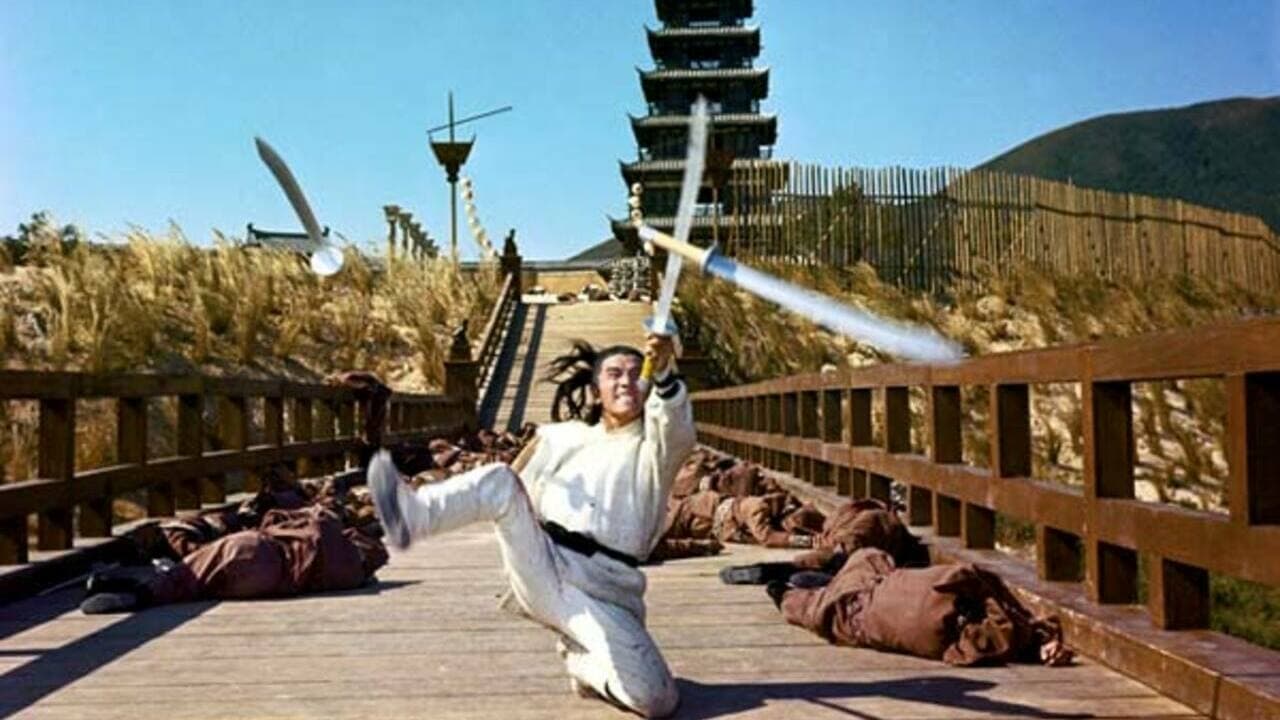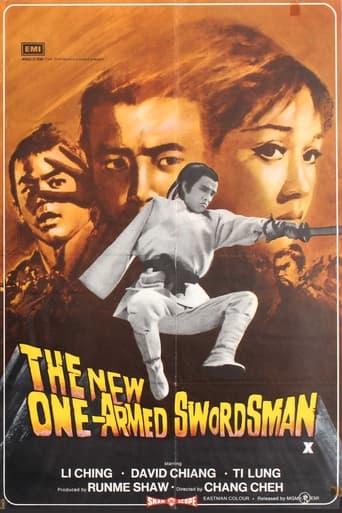



Very well executed
Purely Joyful Movie!
Perfect cast and a good story
I was totally surprised at how great this film.You could feel your paranoia rise as the film went on and as you gradually learned the details of the real situation.
View MoreTHE NEW ONE-ARMED SWORDSMAN has the honour of being one of the finest Shaw Brothers movies I've watched and that's saying something when I enjoy the studio's films in general and have yet to find a film from them which I've really disliked. For me, their best work seems to be that made in the early 1970s, in which the plots were still delightfully old-fashioned but the action was harder-hitting than ever. This film happens to be extraordinarily gory, the goriest I've seen from Shaw outside of FIVE ELEMENT NINJAS.The plot is a reprisal of the films that made Jimmy Wang Yu a star, i.e. THE ONE-ARMED SWORDSMAN and its sequel. David Chiang is the hero who loses his arm in a duel and becomes a reclusive waiter until Ti Lung shows up and galvanises him into action once more. Chang Cheh was an excellent director and he's at the top of his game here; not only are the widespread action sequences impressively skilled and visually masterful, but the rest of the movie looks fantastic too, especially the framing shots. The incredible bloodshed is really ghoulish here and really goes over the edge at times. Chiang has never been better as the brooding hero - don't expect any of his trademark humour here - and Ti Lung excels in a star-making turn. Add in Ku Feng's truly malevolent bad guy and you have a classic of Shaw cinema.
View MoreI can't remember the details behind the reason why Wang Yu left the franchise, but Chang Cheh replaced him with David Chiang in the titular role, and of course it's a totally new character, having his own motivations and background, as compared to Yu's Fang Gang.Written by Ni Kuang (author of HK's popular Wesley science fiction series), the new one- armed swordsman is now Lei Li (Chiang), an arrogant young swordsman whose specialty is his "yuan-yang" double swords. A hotheaded, up and coming hero, a diabolical plot was hatched by Lung I Ching, a veteran swordsman in the martial arts world, to keep these young upstarts at bay. With his three-joint-poles, which always seem to defy gravity, he schemes and manages to duel with Lei Li, defeating him and caused Li's arm to be chopped off.Herein lies the difference between this One Armed Swordsman, and the original Fang Gang. Fang Gang had lost his arm because someone else hacked it off in a fit of rage. Here, Lei Li actually gambled with his arm - the loser of the duel would have to remove it, and retire from "society". While Fang Gang had to learn his martial arts all over again, Lei Li was already skilled with his left hand, because he was originally ambidextrous. Also, Fang Gang's weapon of choice is his father's iconic broken sword, Lei Li doesn't seem to have any preference, and could fight with any.While there is a token romance with the daughter of a village blacksmith, the introduction of a special sword didn't seem to auger well, and it didn't last - it lacked something special, be it emotions or prowess, and seemed too generic. Anyway, I can't help but to chuckle at Ti Lung's character Feng Chun-Chieh, also a young upcoming swordsman who uses two swords. Chun-Chieh and Lei Li formed a sense of brotherhood when the former protected the latter from bullies, only because the latter doesn't wish to use his martial arts skills anymore. They become fast friends, but from the way their scenes were shot - the numerous hugs, back-slapping, arm holding, eyes longing, you might be expecting one of them to say that if only he knew how to quit the other.That aside, you'd come to expect the usual ketchup blood laden violence which have become the hallmarks of Chang Cheh's swordfighting movies. Here, it doesn't get any less bloody, and scenes can be quite graphic with the numerous decapitations of limbs, and one really interesting decapitation of half a human body, across the waist. There are plenty of set action pieces, like that iconic fight on the bridge with many footsoldiers simultaneously. Scenes like these are what Tarantino adopted in his homage Kill Bill double feature, where the hero goes on an unstoppable roaring rampage. Though I must admit the introductory fights don't contribute much to the plot - just there for the sake of showing off what Lei Li can achieve.All in all, it's great fun, just to watch what our parents were watching as they grew up, and comparing these films to the standards of today. While cheesy, the good old classics stand out for their groundbreaking effort in those days, to bring us what has evolved till now.Code 3 DVD contains minimal extras, just one trailer, a photo gallery, the original poster, one general paragraph passing off as production notes, a biography and selected filmography of the cast and crew.
View MoreThis is 1 of the best movies I have seen so far!Its always nice to see david chiang and ti lung playing togheter with eachother !Like some guy explained before , you can learn from this movie , because although you have a handicap you can still be improving your skillz.This story is well made , like mentioned before a guy Lei Li losing his arm to a corrupt "held" Lung. After being retired for a year a brother Feng come to his place where he acts like a bartender. While he was demolished by some people from the Tiger Fort , Feng teached Lei Li to appreciate himself again. Then one day Feng is losing his battle in the Tiger Fort against Lung , Lung used the same trick he used to do to Lei Li to with his sticks. After that Lei Li sworn revenge and the ending is amazing ! He defeats a whole squad of fighters from the Tiger Fort! And once again he meets Lung , the man that made him retire for a year. A very nice battle at the end !Anyway just watch the movie then you know what I mean ! :-)Greetz!
View MoreTHE NEW ONE-ARMED SWORDSMAN (aka TRIPLE IRONS, 1971) follows director Chang Cheh's earlier one-armed swordsman films (ONE-ARMED SWORDSMAN, RETURN OF THE ONE-ARMED SWORDSMAN) but replaces departing star Jimmy Wang Yu with the director's newer find, David Chiang, who is joined by frequent co-star Ti Lung. It's a colorful, occasionally moody historical adventure shot on Shaw Bros.' sprawling Hong Kong backlot and features a climactic battle in which the titular hero takes on an army of bad guys single-handed. David plays a swordsman tricked into a duel to defend his honor with a corrupt swordfighting teacher (Ku Feng) who causes him to cut off his own arm. He leaves the `gallant fraternity' and broods in isolation, making a living as a waiter at a roadside tavern. When a wandering swordsman, played by Ti Lung, learns who he is and gives him a pep talk, David is stirred, but refuses to take action. When Ti is killed by the same corrupt teacher, who uses a lethal three-section staff, David is finally spurred to action and, armed with a dead warrior's sword given to him by the tavern owner's sympathetic daughter (Li Ching), he goes after the offending gang of fighters and figures out a 3-sword move designed to beat the 3-section staff. Before he's through, he leaves a trail of corpses littering a massive bridge leading to the gang's fortress.David Chiang may not have been the best martial artist, but he had a wiry, energetic quality that served him well in this type of slashing and swirling fighting style. He also exuded a brooding intensity that came in handy in his portrayal of the onetime swordsman, who is crippled both physically and psychologically and has turned his back on his calling. Chiang and Ti Lung worked well together in violent tales of male bonding in turbulent eras. The villains here, Ku Feng and Chen Sing, both excelled at playing devious and crafty characters capable of unctuous charm one minute and great cruelty the next.Famed martial arts director Lau Kar Leung worked on the fight scenes, in which kung fu takes a back seat to swashbuckler-style sword- and weapons play. (Lau was an expert in both styles of fighting.) This was one of a group of costume epics made by Chang Cheh prior to his series of Shaolin-themed martial arts films, dating from 1973-76, which put kung fu in the foreground and were made initially in collaboration with Lau, who broke off in 1975 to direct his own films.
View More